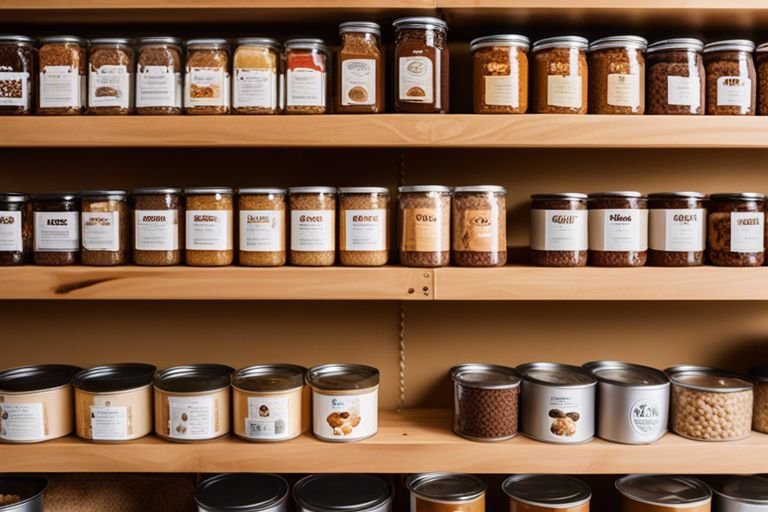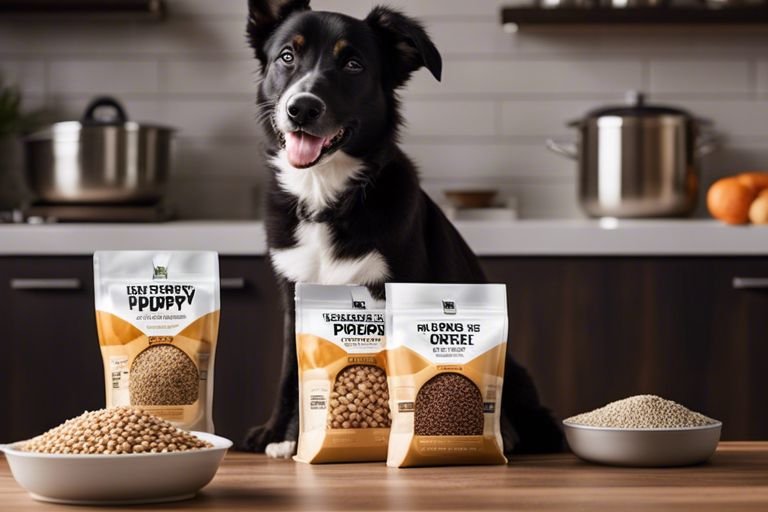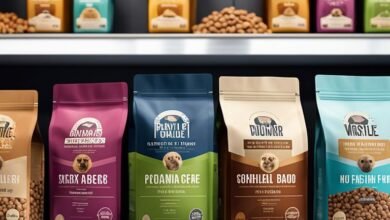‘Homemade Vs. Commercial Grain-Free Puppy Food – Which Is Best?’

When considering choosing the best diet for your growing puppy, the decision between homemade and commercial grain-free puppy food can be a daunting one. Both options have their advantages and disadvantages, and it’s important to consider factors like nutritional content, convenience, and cost. In this blog post, we will explore the differences between homemade and commercial grain-free puppy food, as well as provide recommendations on which option may be best for your furry friend.
Key Takeaways:
- Ingredients: Homemade grain-free puppy food allows you to control the quality of ingredients used, ensuring they are fresh and natural.
- Nutritional Balance: Commercial grain-free puppy food is formulated by experts to ensure it meets all the nutritional requirements for growing puppies.
- Cost: Homemade grain-free puppy food may be more cost-effective, especially if you can buy ingredients in bulk or grow them yourself.
- Convenience: Commercial grain-free puppy food is convenient and saves time compared to preparing homemade meals daily.
- Variety: Homemade grain-free puppy food offers more variety in ingredients, allowing you to tailor meals to your puppy’s preferences and dietary needs.
Understanding Grain-Free Puppy Food
The Basics of Grain-Free Diets for Puppies
The concept of grain-free diets for puppies revolves around the idea of eliminating grains like wheat, corn, and soy from their food. These grains are often used as fillers in commercial dog food but may not provide the necessary nutrients that puppies need for optimal growth and development.
The Debate on Grain-Free Food for Dogs
The debate surrounding grain-free food for dogs has been a topic of discussion among pet owners and veterinarians. Some believe that grain-free diets can help prevent allergies and improve digestion in dogs, while others argue that grains in moderation can be beneficial and that eliminating them entirely may lead to nutritional deficiencies.

Homemade Grain-Free Puppy Food
There’s a growing trend among pet owners to prepare their furry friends’ food at home, and this includes grain-free diets for puppies. Homemade grain-free puppy food allows pet parents to have more control over the ingredients that go into their fur baby’s meals. While it can be a bit more time-consuming than simply pouring kibble from a bag, many find it to be a rewarding and healthier option for their four-legged companions.
Benefits of Making Your Puppy's Food at Home
Benefits of preparing grain-free puppy food at home include knowing exactly what goes into your pup’s meals. You can select high-quality ingredients, tailor the recipe to your puppy’s specific needs, and avoid any fillers, additives, or preservatives commonly found in commercial pet foods. Additionally, cooking your puppy’s food at home can provide a bonding experience and give you peace of mind knowing the freshness and quality of the ingredients.
Potential Risks and Considerations
Food safety and nutritional balance are crucial factors to consider when opting for homemade grain-free puppy food. While home-cooked meals can be nutritious, it’s imperative to ensure your puppy’s diet meets all their nutritional requirements. Consulting with a veterinarian or a pet nutritionist to create a well-balanced meal plan is highly recommended to prevent any deficiencies or excesses that could harm your puppy’s health. Additionally, food preparation hygiene is vital to reduce the risk of contamination and foodborne illnesses.
Commercial Grain-Free Puppy Food
Despite the ongoing debate on whether homemade or commercial dog foods are better, there are numerous high-quality commercial grain-free options available for puppy food. For further insights on the topic, you can check out this discussion on Homemade vs. commercial dog foods?
Evaluating Commercial Grain-Free Options
Grain-free puppy foods can be a suitable option for some dogs, especially those with specific dietary needs or sensitivities to grains. However, not all commercial grain-free options are created equal. It’s important to carefully evaluate the ingredients and nutritional content of the food you are considering for your puppy.
How to Choose Quality Commercial Grain-Free Food
One of the crucial factors to consider when selecting a commercial grain-free puppy food is the quality of ingredients used. Look for options that contain high-quality animal proteins, important vitamins and minerals, and are free from artificial additives and fillers. Reading labels and researching brands can help you make an informed decision about which food will best meet your puppy’s nutritional needs.

Nutritional Aspects of Grain-Free Diets
Many pet owners are opting for grain-free diets for their puppies due to various reasons such as allergies, sensitivities, or simply following a trendy diet. In the matter of choosing between homemade and commercial grain-free puppy food, understanding the nutritional aspects is crucial for the optimal development of your young furry friend.
Essential Nutrients for Growing Puppies
An crucial aspect of any puppy diet is ensuring they receive the necessary nutrients for healthy growth and development. This includes proteins, fats, carbohydrates, vitamins, and minerals in the right proportions to support their overall well-being.
Comparing Nutrient Profiles: Homemade vs. Commercial
Grain-Free Nutrition: Homemade vs. Commercial
| Nutrient | Homemade |
|---|---|
| Protein | Variable, may lack consistency |
| Vitamins & Minerals | Dependent on ingredients and supplements |
| Quality Control | Potential for contamination or imbalance |
Grain-free commercial puppy food is formulated by experts to meet the specific nutritional needs of growing puppies. These products undergo strict quality control measures to ensure consistency and balance in nutrient profiles. On the other hand, homemade grain-free diets may lack the same level of oversight, leading to potential deficiencies or imbalances if not carefully planned and executed.

Puppies
Comparing Nutrient Profiles: Homemade vs. Commercial
| Nutrient | Commercial |
|---|---|
| Protein | Consistent levels for proper growth |
| Vitamins & Minerals | Balanced formulation for overall health |
| Convenience | Ready-to-serve and easy to portion |
Commercial grain-free puppy food offers a convenient and reliable option for providing crucial nutrients to your growing pet. With balanced formulations and consistent levels of key ingredients, these products can help support your puppy’s development without the uncertainty that may come with homemade diets.
Pros and Cons of Homemade vs. Commercial Grain-Free Puppy food
| Homemade | Commercial |
| Control over ingredients | Convenience |
| Freshness | Consistent formulation |
| No preservatives | Long shelf life |
| Customizable to specific dietary needs | Regulated nutritional standards |
| May be more cost-effective | Easy to store and travel with |
Cost Comparison and Time Investment
One of the key considerations when deciding between homemade and commercial grain-free puppy food is the cost and time investment involved.
| Homemade | Commercial |
| May require more time for preparation | Convenient and ready to serve |
| Ingredients can be more affordable | Can be more expensive per serving |
Tailoring Diets to Individual Puppy Needs
Investment in tailoring diets to individual puppy needs can have a significant impact on the health and well-being of your furry friend. It is crucial to consider your puppy’s specific requirements when selecting the type of food to feed. Homemade meals allow for customization based on factors such as allergies, sensitivities, and specific dietary preferences. On the other hand, commercial puppy food has regulated nutritional standards that ensure a balanced diet for growing puppies.
Final Words
Summing up, when it comes to choosing between homemade and commercial grain-free puppy food, there are several factors to consider. While homemade recipes provide control over ingredients and quality, commercial options are convenient and often formulated by experts. It’s important to weigh the pros and cons of each option and consider the specific needs of your puppy. Consulting with a veterinarian can also provide valuable insight into which choice may be best for your furry friend. Ultimately, the best choice will depend on your individual circumstances and what works best for your puppy’s health and well-being.
FAQ
Q: Why is grain-free puppy food popular?
A: Grain-free puppy food is popular because it is believed to be closer to a dog’s natural diet, free of fillers like corn, wheat, and soy, and may help with allergies and digestive issues in some dogs.
Q: What is the difference between homemade and commercial grain-free puppy food?
A: Homemade grain-free puppy food is prepared at home using fresh ingredients, while commercial grain-free puppy food is mass-produced and packaged for convenience.
Q: Is homemade grain-free puppy food better than commercial options?
A: Homemade grain-free puppy food can be beneficial as you have control over the ingredients, but it requires proper research and balance to ensure your puppy gets all the necessary nutrients. Commercial options, on the other hand, are formulated by experts to meet a puppy’s nutritional needs.
Q: What should I consider when choosing between homemade and commercial grain-free puppy food?
A: Consider factors like your puppy’s specific dietary needs, your time and ability to prepare homemade food, cost, and the quality of ingredients in commercial options when making a decision.
Q: Which is the best option for my puppy: homemade or commercial grain-free puppy food?
A: The best option for your puppy depends on various factors like your lifestyle, budget, and your puppy’s health needs. Consult with your veterinarian to determine the most suitable choice for your puppy’s unique requirements.




